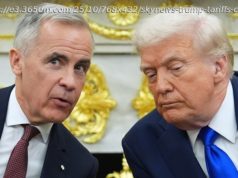The 10 day Jones Act waiver from the Trump administration hasn’t resulted in any new relief getting to Puerto Rico after Hurricane Maria.
When the Trump administration waived the Jones Act in Puerto Rico for 10 days on Sept. 28, it was hailed as an important step for the U. S. territory’s recovery from Hurricane Maria.
But the president’s waiver, which expires on Sunday, has made little difference in the flow of aid to Puerto Rico so far.
None of the 12 known ships that are operating under the waiver — which allows foreign ships to transport goods from U. S. ports to Puerto Rico — have arrived or unloaded cargo in San Juan, according to the Department of Homeland Security.
Three of the 12 ships also appear to be headed to foreign ports, a Homeland Security spokesman said.
The shipping information is voluntarily provided to Homeland Security by shipping carriers, so there could be additional ships operating under the waiver without Homeland Security’s knowledge. Under the waiver, ships must be loaded by Sunday and then have an additional 10 days to deliver their cargo to Puerto Rico, so the total number of ships operating under the waiver could increase by October 8.
It typically takes five days to deliver goods by boat to Puerto Rico from Miami and seven days from Jacksonville. Jacksonville’s port is the main hub for transporting U. S. goods to Puerto Rico.
The 1920 Jones Act requires ships transporting goods within the country to be built, owned and operated by U. S. citizens or permanent residents.
When the Trump administration initially decided to not waive the Jones Act in Puerto Rico after Hurricane Maria made landfall on Sept. 20, the backlash was fierce. Critics accused the businessman-turned-president of rallying behind the interests of the U. S. shipping industry instead of putting the needs of Puerto Rico first.
“Puerto Rico is broke and the federal government already controls the purse strings through the financial control board or Junta that was imposed by Congress,” said Rep. Luis V. Gutiérrez, D-Ill. “In their hour of need, Washington can help by suspending the Jones Act and suspending cost-sharing obligations.”
Trump himself fueled criticism when he said, “we have a lot of shippers and a lot of people who work in the shipping industry who don’t want the Jones Act lifted.”
The president eventually changed course and granted the 10-day waiver when Puerto Rico Gov. Ricardo Rosselló requested it.
But during a congressional hearing on Oct. 3, representatives from Tote Maritime and Crowley, two of the biggest U. S. shipping companies tasked with delivering goods to Puerto Rico, told the House Transportation Committee that they hadn’t heard from any foreign shipping companies wanting to do business under the Jones Act waiver.
“Our companies operate two of the three terminals in the port of San Juan that would be contacted in order to unload vessels that would be under the waiver,” said Tote CEO Anthony Chiarello. “We have not received a call requesting the need to unload the ships.”
According to real time marine traffic data, there is not a single foreign-flagged ship docked in the Port of San Juan that traveled there from a U. S. port as of 6 p.m. Friday. There are at least three foreign-flagged cargo ships that are currently en route to San Juan from U. S. ports, which could be a portion of the 12 ships operating under the Jones Act waiver. Two of the ships are oil tankers and one is a container ship.
“Crowley has now delivered our 1,000th container load of FEMA relief supplies alone to Puerto Rico, and a lot more are on the way – and we have delivered thousands more containers of commercial supplies that will aid the recovery,” said Crowley spokesman David DeCamp in an email. “And other Jones Act carriers are working hard as well. We are unaware of any non-Jones Act carriers that actually have utilized the waiver.”
The Jones Act does not prevent foreign-flagged ships traveling from other countries from going directly to Puerto Rico. Over two-thirds of the goods transported to Puerto Rico come from foreign ports.
“Foreign-flag carriers serving Puerto Rico from foreign ports operate under different rules, regulations, and supply and demand conditions and generally have lower costs to operate than Jones Act carriers have,” said a 2013 Government and Accountability Office report that assesses Puerto Rico’s maritime trade.
The degree to which the Jones Act causes goods in Puerto Rico to become more expensive is an open debate. Puerto Rican politicians tend to oppose the Jones Act, while the U. S. shipping industry and many members of Congress who represent states like Florida with thousands of jobs that depend upon the Jones Act argue that it is a necessary tool for national security and promoting American jobs.
“The Jones Act… makes everything that comes into Puerto Rico… more expensive, and it can be repealed,” San Juan mayor Carmen Yulín Cruz said to CNN.
New York Rep. Nydia Velázquez, who is Puerto Rican and the first member of Congress to visit Puerto Rico after Maria, wants the Jones Act repealed permanently because she argues it hurts the island’s economy.
Some conservative lawmakers like Sens. John McCain and Mike Lee are also pushing for a Jones Act repeal on the grounds that the law stifles economic competitiveness.
“You’ve got folks on the left and the right, Democratic Party and Republican Party, all piling onto the Jones Act,” said Brian Schoeneman, political director for the Seafarers International Union.
But politicians in Florida are beneficiaries of the law, putting them in a difficult position as they try to advocate for Puerto Rico’s recovery without harming the domestic shipping industry.
Sen. Bill Nelson is the highest ranking Democrat on the Senate Transportation Committee and a longtime supporter of the Jones Act. He deflected questions from Puerto Rican business leaders on Friday after they pressed him about extending Puerto Rico’s Jones Act waiver.
Sen. Marco Rubio, who said last week the Jones Act should be waived for Puerto Rico “as it has been for every major storm since Katrina,” did not respond to a request for comment on whether he supports an extension of the waiver.
Home
United States
USA — Political The Jones Act was supposed to help Puerto Rico, but aid hasn’t...






